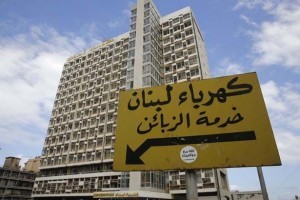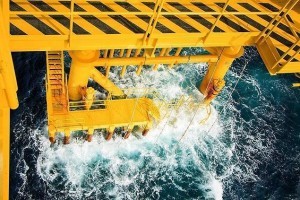خطة طوارئ لإنقاذ قطاع الكهرباء – جريدة النهار
رودي بارودي – خبير في قطاع النفط والغاز
يعاني قطاع الكهرباء مشكلات عدّة ومصاعب لا تزالُ تلقي بسكنها على الإقتصاد اللّبناني عموماً وعلى موازنته خصوصاً، على الرّغم من الخطط التي وضعتها الوزارات المتعاقبة، كان آخرها الخطة التي أقرّها مجلس الوزارء في حزيران 2010. وتتشعب مشكلات القطاع من الإنتاج إلى التوزيع إلى الجباية، على الرغم من تلزيمها إلى الشركات الخاصة.
يحتاجُ هذا القطاع الحيوي أولاً إلى القرار السياسي، وثانياً إلى إبعاد المصالح الشخصية والآنية عن معالجة مشكلاته. من هنا، نرى واجب وضرورة إحترام القوانين الصادرة عن مجلس النواب وتنفيذها عبر:
1- بت وحسم كل الإشكالات المالية والإدارية، مع متعهد اشغال بناء معمل جديد في ديرعمار بقدرة 435 ميغاواط في أسرع وقت ممكن والطلب اليه بدء التنفيذ فوراً، على أن يترافق ذلك مع تكليف مجلس الإنماء والإعمار العمل على تأمين المال اللّازم من طريق الصناديق والمؤسسات الداعمة لتنفيذ معمل جديد بالقدرة ذاتها في حرم معمل الزهراني، لتوفير الحد الأدنى من الطاقة الكهربائية التي يحتاج إليها لبنان حالياً.
ولا بدّ من الإشارة إلى أنَّ مصلحة لبنان تكون في عدم الدخول بخلاف مع المتعهد يؤدّي إلى محاكمات أو اللجوء الى التحكيم وانتظار نتائجه لسنوات، ويدرك الجميع أنَّ إجراءات التلزيم التي اعتمدتها وزارة الطاقة والمياه تشوبها الكثير من الثغرات.
2- الإسراع في استلام الوحدات التي جرى تلزيمها في معملي الذوق والجيه وتشغيلها، تمهيداً لوضعها في الخدمة.
3- ضرورة الإسراع في تعيين هيئة تنظيم قطاع الكهرباء، وبدء تطبيق القانون 462/2002 بعدما عطل تنفيذه على مدى أكثر من 14 عاماً، من دون سبب قانوني أو شرعي وبمزاجية الخوف على صلاحيات مزعومة للوزير اذا ما مارست الهيئة استقلاليتها.
إنَّ صدور القانون رقم 288 تاريخ 30/4/2014 يدلُّ بطريقة لا شك فيها، إلى أنَّ الحكومة عجزَت بشكل كامل عن تطبيق القانون 181/2011، فلجأت إلى إصدار قانون ليحل مجلس الوزراء محل هيئة تنظيم قطاع الكهرباء، بعدما عجزت الحكومات المتعاقبة عن تعيين هيئة من خمسة أشخاص أو انّها لا تريد، وبشكل فاضح تطبيق القوانين الصادرة عن مجلس النواب. إذ إنَّ عدم التنفيذ الكامل لبنود القانون 181 دفع المشرع الى اللجوء الى إقرار القانون رقم 288/2014 بمادة وحيدة ليعدل المادة السابعة من القانون 462/2002، كما أضاف إلى المادة السابعة من القانون رقم 462 تاريخ 2/9/2002 (تنظيم قطاع الكهرباء) الفقرة الآتية:«بصورة موقتة، ولمدّة سنتين، ولحين تعيين أعضاء الهيئة واضطلاعها بمهامها، تمنح أذونات وتراخيص الإنتاج بقرار من مجلس الوزراء بناءً على اقتراح وزيري الطاقة والمياه والمالية».
كلُّ ذلك زاد الأمر تعقيداً، خصوصاً أنَّ إقرار كل هذه القوانين لا يهدف إلّا إلى التهرب من تعيين الهيئة الناظمة للقطاع الكهربائي، علما أنَّ الهيئات الناظمة لقطاع الكهرباء والطاقة في العالم أثبتت نجاحها في دول العالم عموماً وأوروبا خصوصاً، إذ استطاعت تنفيذ استراتيجيات ناجحة ومتقدمة في مختلف مجالات الطاقة.
4- التطبيق الإستنسابي لمواد القانون 181/2011 جعل منه أداة طيعة كما بينا ذلك سابقاً، وما زادَ الأمر سوءاً هو عدم تنفيذ كامل الشروط التي وضعها القانون 181/2011 فلا تعديلات أدخلت على متن القانون 462/2002 خلال الأشهرالثلاث، ولا حتى في 4 سنوات. كما لم يعين مجلس إدارة جديد لكهرباء لبنان ولم يتم متابعة انجاز المشاريع التي لزمت والزمت لبنان بمبالغ مالية ضخمة.
5- بناء معملي الزهراني ودير عمار بنيا أصلاً تنفيذاً لخطة نهوض وطني وضعت عام 1994، ليعملا على الغاز الطبيعي وليس على الديزل أويل، بناء على نصيحة من شركة كهرباء فرنسا، لما يؤمنه استعمال الغاز الطبيعي في انتاج الطاقة من وفي كلفة الإنتاج، وتخفيف الضرر على البيئة، لكنّ المناكفات السياسية والمزاجيات الشخصية لبعض المسؤولين منذ عام 2002 عطلت المشروع، ما كبّد الخزينة مبالغ طائلة عن مشتقات نفطية.
وبما أنَّ خط الغاز العربي الذي بدأَ العمل على إنجاز بعض أجزائه، ونتيجة ما يجري في المنطقة، جعلت من المستحيل في المدى المنظور استكماله والإفادة منه.
وبما أنَّ تشغيل معامل الكهرباء على الغاز الطبيعي بات متعذراً من دون وجود محطات تخزين وتسييل الغاز الطبيعي بالقرب من معامل الإنتاج أمراً لا بد منه ولا بديل عنه، أصبح لزاماً على الدولة أن تبدأ شراء أو استئجار او إنشاء محطة عائمة لتخزين وتسييل الغاز الطبيعي لزوم معملي الإنتاج في الزهراني ودير عمار، بحيث تقام محطة عائمة في كلّ منهما ولو احتاج ذلك الى توسيع المرفأ أو إنشاء سدّ للأمواج لحماية المحطة من العوامل البحرية.
توازياً، إنَّ إنشاء المحطتين يؤدّي إلى وفر هائل في ثمن المحروقات، ما يؤدي بدوره إلى خفض الدعم لمؤسسة كهرباء لبنان وتخفيف نسبة الدين والفوائد المترتبة عليها، لا سيما أنَّ إمكانات الدولة، مؤسسة كهرباء لبنان، في مجال جباية مستحقاتها ومنع الإعتداء على شبكاتها لا تزال قصرة، ما يخفض قدرتها على لجم العجز أو مواجهته بتفعيل الجباية.
ونرى من الأفضل استئجار محطة عائمة في كل معمل، على أن يكون المورد صاحب خبرة عالمية في هذا المجال، ولديه القدرة على أن يورد الغاز الطبيعي بالاضافة الى المحطة في الوقت نفسه. لما في ذلك من وفر في الكلفة والإشراف والمراقبة، بحيث ينص دفتر الشروط الموحد على أن يتم التعاقد على طريقة مفتاح باليد، اي أن تحصل مؤسسة الكهرباء على الغاز الطبيعي الذي تحتاجُ إليه معاملها بشكل واضح ومحدد الكميات والكلفة، وهي الطريقة التي اعتمدتها دول عدّة بينها الكويت، دبي والأردن.
أخيراً، إنَّ ملفاً بهذا الحجم الوطني والخطورة في حال استمراره يستحسن أن يكون برعاية رئيسي مجلسي النواب والوزراء في الوقت الحاضر، خصوصا أنَّ الرئيس نبيه بري أبدى اهتماماً واسعاً في إنقاذ القطاع ولم يوفر جهداً في هذا السبيل، على أن تتم مقاربته بشفافية وتقنية وحس وطني مسؤول لإنقاذه وحماية الخزينة من تداعيات الهدر الناتج منه، وتفادي الخسائر التي تتكبدها الدولة جراء معالجته.




